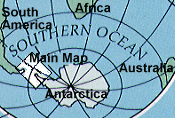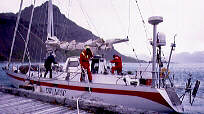
![]()
.
.
.
.
.
.
.
.
.
.
.
.
.
.
.
.
.
.
.
.
.
.
.
.
.
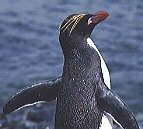
.
.
.
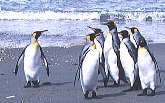
.
.
.
.
.
.
.
.
.
.
.
.
.
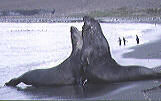
![]()

[
Logbook Index ]

Log
Entry for 30 January - 2February 1997
Position 2 Feb: 54-17S 36-30W.
Click
map for detailed chart
Above 2 Feb moored to the jetty at Grytviken.
See below for more on Cooper Bay wildlife 30/31 Jan.
30 JanuaryMorning in Cooper Bay is like waking up in an enormous animal playground or holiday resort. From the boat you can see fur seals covering the beach. There are pups playing in the water everywhere. You hear growling, a sort of barking, or the young ones that sound like they are crying. Groups of different types of penguins walk in their awkward funny way to and away from the shore line according to the time of day. Huge, sleepy looking Elephant Seals laze about scratching themselves with a flipper. This is really the place for observing wildlife close-up, but as we are all soon to learn it is not easy to wander about because of the fur seals. Skip and I are the first to go ashore and I soon realize that the fur seals, although playful, have an alarming tendency to run up to you growling with their mouth open as if ready to bite. You have to be on continuous alert and have a walking stick with you to fend them off. At this time of year, the hills behind the beach are covered in beautiful green tussock grass. Supposedly you don't find any seals in these areas...but I soon discover there are many of them hiding and resting there. It is very peculiar and amusing to see little seal heads pop up suddenly in the middle of the grass, far away uphill from the beach. Sealing began shortly after the discovery of South Georgia by Captain Cook in 1775. Ships from America and Europe started voyaging here regularly to hunt fur seals for their skins and sea elephants to make precious oil out of their blubber. An amazing 57,000 fur seal skins were taken by an American sealer between 1800 and 1802. Thirty years later the seals were already found to be scarce. In 1881 the first series of ordinances to regulate sealing was enacted. By 1910 it was no longer profitable for expeditions to travel this far south for furs and sealing ended in 1913. Elephant seals were a little more lucky and remained distributed throughout the area, although greatly reduced in number. Their population had recovered sufficiently for a second exploitation between 1909 and 1964. Today the fur and elephant seals are no longer hunted and their populations have re established relatively quickly. The present rate of growth of the population has been estimated at about 10% a year. As Skip and I proceed inland we reach a height relatively free of seals and discover a big Macaroni Penguin rookery. The sound of their screaming is loud and continuous. Here we find the organization incredible: all the chicks are kept together in a sort of creche, like a kindergarten surrounded by adults who guard and protect the little ones. The chicks have grey feathers and have not yet developed the yellow-orange crest of the adult Macaroni. Closer to the water there is a beautiful group of King Penguins shuffling about. these are taller-maybe almost a meter high- and lean. They have a very aristocratic look to them with silver grey feathers and golden yellow plumage around their throat and neck. The sound they emit is not as crackly as that of other penguins. It is almost musical, a deep trumpet sound in a long single note. Later on we take the dinghy to check the mooring lines on shore. During one of these operations Skip is attacked by a fur seal and ends up running over the rocks in circles before he is able to escape from his pursuer!! We then ride to another beach further inside Cooper Bay. Here we find some grown elephant seals, at least 4 almost mature beachmasters - enormous, monstrous, but fascinating with elephant-like noses and big staring eyes. They remind me of a big fat mafia boss sitting in his restaurant with all the women around waiting for his orders. 31 JanuaryThe big surprise comes when I pop my head out of the hatch the next morning. The landscape has completely changed and is covered in pure white snow. The fur seals are still everywhere and the penguins are busy as ever. On the slopes above, the fur seals are amusing themselves, and us, by sliding in the snow like children at the beginning of winter. From the beach to the top of the hill there is a sort of "penguin highway". From a distance the little Gentoos look like many sherpas, all climbing up the mountain in a straight line. These are actually the adults which have gone to sea to get food for the chicks which still live up in the rookeries. They are the most amusing thing to watch as they walk one after the other sometimes slipping and falling flat on their faces (or rather their beaks!). The rookery is home to a large number of grown chicks that are shedding their downy grey and chasing each other around in what looks like a slap- stick comedy. They are actually fighting to get more food. The adults regurgitate the food from their crop and the chicks take it straight from their beaks. We are only 100 m. above sea level and its snowing and foggy but the view from the rookery is totally unique. Sitting on a piece of tussock grass, half covered with snow and surrounded by playing Gentoo penguins we can see white valleys studded with fur seals and in the distance the little inlet where Pelagic is anchored. Before returning to the boat, we go back to the Elephant Seal beach to witness the high point of the day: The four beachmasters are now rolling in the big surf, challenging each other for supremacy. In an almost mythological scene - the giant creatures raise their bodies from the murky water, butt their chests together and snap at each others throat. They open their pink mouths and emit what sounds like a prehistoric growl. They push at each others heads with what must be incredible strength. This goes on for some minutes and then one of them stops and rolls in the surf all the time staring at the two of us dressed in bright red foul weather gear and taking pictures from the beach! We feel as though we are disturbing their solitary struggle and leave them to it, returning to Pelagic at the end of a marvelous day in South Georgia! Elena Caputo |
